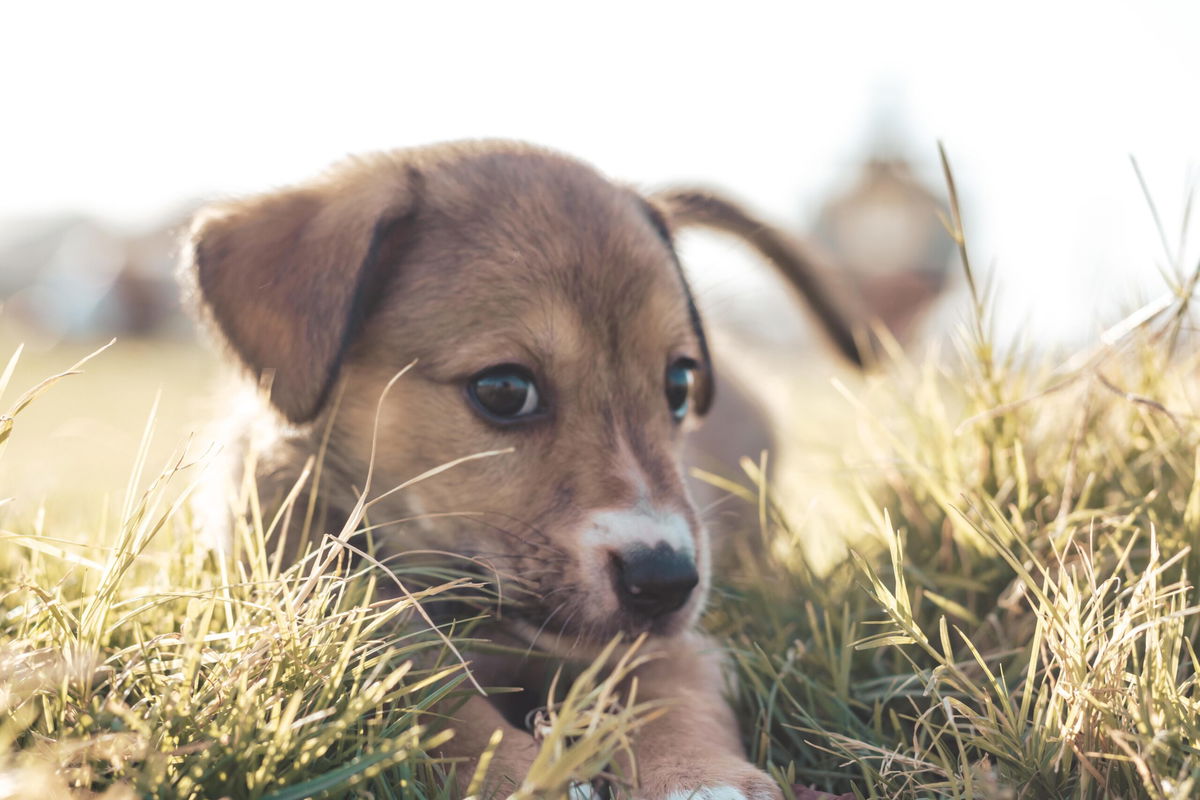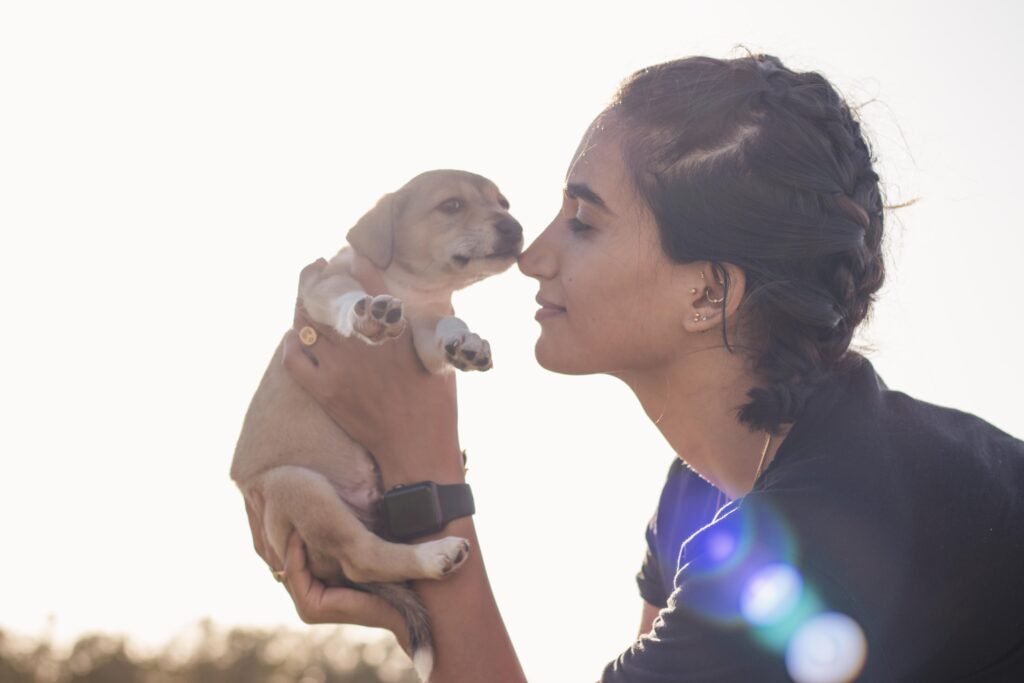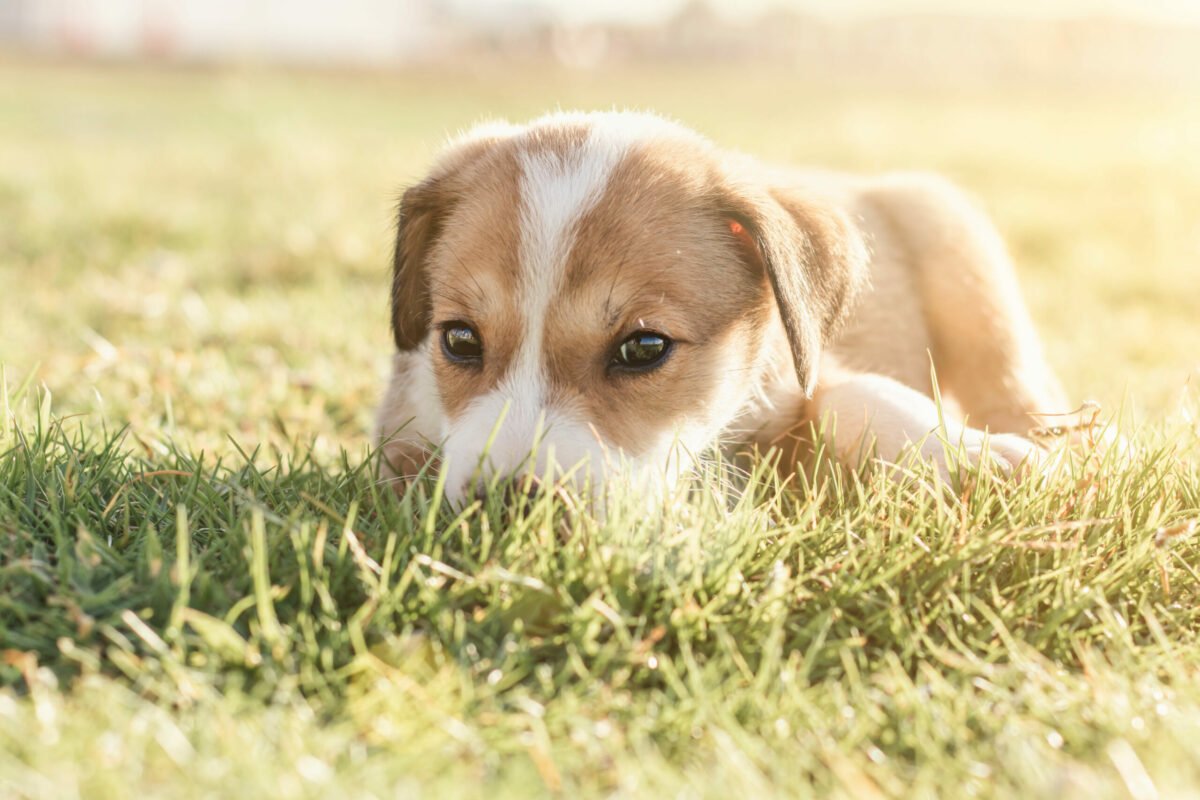We're an affiliate
We hope you love the products we recommend! Just so you know, we may collect a share of sales or other compensation from the links on this page at no additional cost to you. Thank you if you use our links, we really appreciate it!
With any new puppy, it’s hard to determine what is normal puppy behavior and what isn’t.
If you’re new to owning a puppy it can be especially hard. The good news is that we are going to cover this exact question and what to do about it in this article.
Let’s start taking the guesswork out of your puppy’s behavior.
Why Is My Puppy Whining So Much?
There are a multitude of different factors that can cause a puppy to whine. There are also different developmental stages that cause different whining patterns.
Whining is a form of communication, so learning why your puppy whines may be very important to their well-being.
Reasons Behind Puppy Whining
There are four main reasons why a puppy may be whining:
- Communication and attention seeking. Puppies often use whining to get your attention and communicate with you. They have learned through social interactions with us that noise is a great way to get us to respond to them. If you are doing something that doesn’t involve your puppy, they may whine to get your attention.
- Physical Discomfort or pain. Sometimes a puppy may whine if they are injured or discomforted. If you have ever seen a dog whining by the back door, you may recognize that as a cue that they need to go to the bathroom. If your puppy is in pain, whining may be a form of getting your attention or even self-soothing.
- Anxiety and stress. Puppies often whine if they are anxious or stressed. An anxious or stressed puppy may whine and cower, to make themselves look less threatening to other dogs or people.
- Boredom and lack of mental stimulation. Boredom often triggers whining and attention-seeking as a call to action. Give me something to do, please! If your puppy doesn’t have enough mental and physical stimulation it can lead to frustrating behaviors such as whining.
Developmental Stages and Whining Patterns
Puppies go through many developmental stages as they grow up and learn new skills. One of the puppy’s first means of communication is whining.
This is why it’s common for whining to crop back up in times when a puppy is unsure of themselves or is learning new things. The key is to start building their confidence to avoid this.
So you know why they might whine, but what causes the whining reaction?
Identifying Specific Whining Triggers in Puppies
There are a few different whining triggers in a puppy.
Analyzing Environmental Factors
Have there been changes in their home or are they in a new place? Are there new animals in their area?
Or maybe the animals they’re used to have changed behavior for some reason. A lack of confidence that their surroundings are normal can be a big trigger for a puppy to start whining.
Health Related Causes
Whining is often associated with pain. As a result, it is important to assess whether your puppy is sick or injured. This may require a vet check if you can’t determine whether your puppy is healthy or not.
Separation Anxiety and Whining
A lot of puppies suffer from separation anxiety if you leave their area. This can be a huge problem and lead to a lot of other destructive behaviors.
Tearing up furniture, going potty in the house, and whining at night if they aren’t allowed in your bedroom.
Use crate or playpen training, white noise machines, and positive reinforcement techniques. All are good tools for easing anxiety.
There are many ways to create an environment that leads to less whining. Let’s talk a bit more about this.

How to Address Excessive Puppy Whining
There are a lot of different ways to address puppy whining. To start, the root cause of whining is often a lack of confidence.
Positive Reinforcement Training
So using positive reinforcement is imperative. Anytime your puppy is doing something well, offer them a treat.
If your puppy is whining and they quiet down on their own, offer them a treat. Building their confidence will reduce their need for reassurance and reduce whining behavior.
This is also why you should avoid punishment-based methods. Punishments tear down your puppy’s confidence rather than build it.
Ensuring Proper Physical and Mental Stimulation
Physical and mental stimulation is another tool to avoid whining in your puppy. Giving your puppy regular exercise routines will help you avoid pent-up energy.
Giving them mental enrichment activities and toys will help stimulate them. Both strategies help with avoiding boredom which is one of the causes of whining.
Establishing a Consistent Daily Routine
Creating a consistent daily routine is a big factor in keeping your puppy from whining. Routine gives your puppy predictability and builds confidence.
Establish a routine that includes food, activity, and rest. This will help them not to whine as they know everything will happen and when.
For example, you wake up in the morning and feed them then maybe you take them on a walk or play fetch.
Next, it’s time for them to rest while you start your workday. Then in the evening maybe you follow that same routine. A consistent schedule goes a long way toward your puppy’s happiness.
There are a few other key ways to make your puppy comfortable in their environment and reduce their whining.
The Role of Crating and Safe Spaces
Why are dog crates important for a puppy? Crates create a designated space for your puppy to exist and feel safe.
Introducing and Using a Crate Correctly
To introduce a crate to your puppy make sure they associate it with positive things:
- Treats
- Blankets that smell of you
- Your attention, sit next to them while they’re in there for the first few times
- Puzzle toys to keep them stimulated
- White noise, to replicate the sound of their mom’s placenta before they were born
When crates are used correctly, it will be a safe space for your puppy to go and feel happy and calm.
Even when you aren’t there, it is a way to give your puppy more routine. Because of this, crating should never be used as punishment for your puppy.
To start, put your puppy’s crate in an area where they feel comfortable. If that is right next to your bed it is ok.
You can slowly move it to a more desirable spot for you and them as they get more and more comfortable in it.
Creating a Den-like Atmosphere for the Puppy
To make your puppy happier in their crate, it is often nice to create a den-like atmosphere.
You could cover the crate with a blanket and put a soft dog bed in there. Make sure that it is in a quiet, dimly lit area of the house. Give your puppy some toys or stuffed animal comfort items.
If your puppy likes to chew or rip things apart be careful what kind of bedding you use. As you don’t want them to ingest anything harmful. If your puppy is a chewer give them some good chew toys instead.
Crate training can make nights easier to navigate with a whiny new puppy but they are still tricky, as some puppies might start crying when placed in a crate, so make sure you introduce them slowly.
How to Manage Nighttime Whining in Puppies
Nighttime is one of the times when you most need a routine for a puppy. Sleep is important so making sure they know what to expect goes a long way towards being successful.
Techniques to Prevent Excessive Whining During the Night
First, you need to remember that your puppy may not be able to hold their pee all night. A good rule of thumb is they can hold it for the same number of hours as their age in months.
For example, a 3-month-old puppy can hold it for 3 hours. As they get older, this rule doesn’t necessarily apply, and you will learn with your puppy how this changes.
The first step to a good night will be taking your puppy out for a potty break as part of their nighttime routine.
Maybe you also want to get a bit of playtime and exercise in, this is a routine you build that suits you and your puppy so that they always know what to expect.
After going outside, it’s a good idea to calm your puppy down. Maybe you do this with a grooming session, or you rub their belly for a bit while playing soothing music. This is another piece of the routine puzzle you are putting together.
Finally, your puppy goes into their crate where they feel safe and comfortable. Crate training will go a long way toward making your puppy relaxed at nighttime.
It’s important to remember that a key contributor to whining is a lack of confidence. Providing a routine, giving your puppy a space where they feel comfortable, and positive reassurance.
All these are important to prevent whining at night. If your puppy does whine, it’s a good idea to take them outside for a little to see if they need to potty.
There will be times when your puppy has accidents. Puppies don’t like to pee or poop where they sleep, so understand they aren’t doing it out of spite, but they are doing it because they can’t help it.
Take them outside calmly, they may still have to go. Then come in and clean up their mess before putting them back in, chances are they were trying to hold it and couldn’t.
You have tried all these tips and still can’t seem to stop your puppy’s whining habit.
When to Seek Professional Help
Sometimes all the tips and tricks in the world aren’t enough to stop a behavior, that’s when it’s time to seek a professional.
Some signs it’s time:
- Destructive behavior: ripping, tearing, chewing, destroying furniture
- Non-stop whining: often accompanied by barking, cowering, or separation anxiety
- Pooing and peeing inside at all times
- Growling and biting
At this point, it’s a good idea to find a dog trainer or behaviorist. They will observe your puppy’s behavior and give you personalized recommendations. Puppies are complex and a one-size answer doesn’t always fit every puppy.
But there are things you can avoid that will make your puppy training easier.

Common Mistakes to Avoid
It is important that you use consistent training methods with your puppy. If you are constantly changing how you train your puppy, they will get confused and won’t know what you want.
It can be very easy to reinforce whining unintentionally. When you give positive reinforcement to your puppy make sure it is not while they are whining. This can be a tricky one, especially at the start of training.
Finally, don’t neglect your puppy’s physical or emotional needs just because you can’t stand whining.
Make sure you give them lots of time to go to the bathroom and that they aren’t whining due to injury.
Give them lots of reassurance throughout their training, and start to build their confidence in themselves and in you, or the whining could get worse.
FAQs
How do I differentiate between normal and excessive whining?
Normal whining typically has a cause and once that cause goes away the whining stops. If your puppy continues to whine nonstop it may be time to seek a professional.
Can health problems be the cause of my puppy’s whining?
Health problems can be the cause of your puppy’s whining. It may be time to seek a professional if they show any other symptoms of injury or illness.
Is it okay to ignore my puppy when they whine?
Your puppy is trying to communicate something to you, so ignoring is not a good solution to fix whining. First, you need to determine what they are trying to tell you and then find a solution to it.
In Conclusion
We have covered a lot of the reasons why puppies whine, how to solve the issues, and when to seek help.
Remember that training doesn’t happen in one night, it can take weeks or months of reinforcing good habits.
But before you know it your puppy will be confident, not whiney, and sleeping through the night.
The more confident and happy your puppy is, the better off you’ll both be.
Laura is the founder of Furs'n'Paws. She is a also a pet writer and expert with more than 20 years of experience of working with dogs and cats. She developed a very strong love for animals at a young age. Her passion led her to establish a thriving pet sitting and dog walking business in Dubai. As an expert in pet training, behavior, and nutrition, Laura is committed to helping pet owners and pet lovers by offering high-quality information on a wide range of topics.



No responses yet